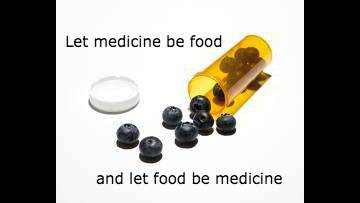Food is Medicine
 “Let your food be your medicine, and your medicine be your food.” -Hippocrates
“Let your food be your medicine, and your medicine be your food.” -Hippocrates
Are you trying to be healthier? It starts with food. Proper gastrointestinal health is paramount in optimizing the immune system. There are many exciting discoveries being made about how our gut communicates with our brain. As it turns out, we are and have always been teaming up with beneficial bacteria to properly defend ourselves from the foreign pathogens and to properly digest and assimilate nutrients. If we count the cells of our body and compare it numerically to the cells of bacteria living on and within us, we are 90% bacteria. Scientists are excitedly analyzing and documenting the human micro-bio genome and finding out that the different types and varying ratios of bacteria in the human population are just as unique and diverse as the genetic genome.
There are many things that effect, for better or for worse, your gut micro flora bacteria. Prescription antibiotics are often given to wipe out harmful bacteria in our bodies. Unfortunately, these drugs do not differentiate between good or bad bacteria. They wipe out ALL of them, leaving you dangerously vulnerable. Chlorine in our tap water acts as an antibiotic in a similar way. Birth control and over the counter NSAIDs, diets low in fiber also contribute to unhealthy gut flora.
The foods we eat and dietary choices we make can make or break our gut micro flora. Refined carbohydrates, sugar and processed foods, fructose in fruits, all encourage, feed, and perpetuate an unhealthy balance of organism. One of the more common harmful yeasts is named Candida Albicans. When this type flourishes within us, it presents itself and masquerades as many different nasty symptoms including: fatigue, hyperactivity, acne, irritability, poor sleep quality, abdominal pain, joint pain, constipation, diarrhea, flatulence, reflux, heartburn, postnasal drip, cough, recurrent urinary tract infections, menstrual irregularities, sinus congestion, sugar and alcohol cravings, inability to lose weight, and much more.
Conversely, there are foods and dietary choices that we can make to encourage, feed, and perpetuate helpful and beneficial bacteria within our gut. Fermented foods like pickles, sauerkraut, kefir, kombucha, and fermented vegetables actually have thousands of colonies of healthy bacteria on them, and we simply eat them to gain benefits that can include: increased energy levels, more comfortable digestion, better immune system, clarity of mind, improved sleep quality, and much more. There are also supplements in a pill form that can easily provide these benefits.
Many different types of medical professionals are utilizing the knowledge and treatment of the human gut micro flora to treat and manage many different conditions including: ADHD, sleeping problems, fibromylagia, asthma, allergies, constipation, diarrhea, IBS, autism, poor immune systems, depression, sinus congestion, and many others.
There are other foods and supplements that we can eat that act as “weed-killers” for harmful bacteria. These have been shown to have bacteriostatic and/or bactericidal properties. Good examples include: onions, honey, cabbage and other cruciferous vegetables, sauerkraut, kim chi, and many herbs like: thyme, mint, basil, cinnamon, rosemary, cumin, chili peppers, caraway seed, coriander, dill, nutmeg, ginger, mustard, and parsley. Try to include some of these in your diet to help kill off the bad guys living in your gut.
If your diet has been poor for a long time, it is likely that you do have an abundance of Candida Albicans in your gut without much healthy bacteria. When you begin changing your diet to promote a better balance of healthy bacteria, it is wise to gradually introduce the changes because you can get much worse before you get better with too much of an aggressive and abrupt change. Just as it is the case with all other healthy habits, a gradual change that is practiced and repeated perpetually will have a greater impact in the long run.
Enjoy your meal,
Kelly Baltuska, DC

 Call 913-283-9803 to schedule
Call 913-283-9803 to schedule